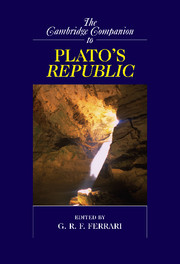Book contents
- Frontmatter
- 1 The Protreptic Rhetoric of the Republic
- 2 The Place of the Republic in Plato’s Political Thought
- 3 Rewriting the Poets in Plato’s Characters
- 4 Wise Guys and Smart Alecks in Republic 1 and 2
- 5 Justice and Virtue: The Republic’s Inquiry into Proper Difference
- 6 The Noble Lie
- 7 The Three-Part Soul
- 8 Eros in the Republic
- 9 The Utopian Character of Plato’s Ideal City
- 10 Philosophy, the Forms, and the Art of Ruling
- 11 Sun and Line: The Role of the Good
- 12 Beginning the “Longer Way”
- 13 The City-Soul Analogy
- 14 The Unhappy Tyrant and the Craft of Inner Rule
- 15 What Is Imitative Poetry and Why Is It Bad?
- 16 The Life-and-Death Journey of the Soul: Interpreting the Myth of Er
- Bibliography
- Index of Passages
- Index of Names and Subjects
- Series List
6 - The Noble Lie
Published online by Cambridge University Press: 28 November 2007
- Frontmatter
- 1 The Protreptic Rhetoric of the Republic
- 2 The Place of the Republic in Plato’s Political Thought
- 3 Rewriting the Poets in Plato’s Characters
- 4 Wise Guys and Smart Alecks in Republic 1 and 2
- 5 Justice and Virtue: The Republic’s Inquiry into Proper Difference
- 6 The Noble Lie
- 7 The Three-Part Soul
- 8 Eros in the Republic
- 9 The Utopian Character of Plato’s Ideal City
- 10 Philosophy, the Forms, and the Art of Ruling
- 11 Sun and Line: The Role of the Good
- 12 Beginning the “Longer Way”
- 13 The City-Soul Analogy
- 14 The Unhappy Tyrant and the Craft of Inner Rule
- 15 What Is Imitative Poetry and Why Is It Bad?
- 16 The Life-and-Death Journey of the Soul: Interpreting the Myth of Er
- Bibliography
- Index of Passages
- Index of Names and Subjects
- Series List
Summary
THE POLITICS OF LYING
Socrates' introduction of the Republic's notorious “noble lie” comes near the end of Book 3 (414b-c). “We want one single, grand lie,” he says, “which will be believed by everybody - including the rulers, ideally, but failing that the rest of the city.” Grand lie? Noble lie? G. R. F. Ferrari has a good note on the issue: “The lie is grand or noble (gennaios) by virtue of its civic purpose, but the Greek word can also be used colloquially, giving the meaning 'a true-blue lie,' i.e. a massive, no-doubt-about-it lie (compare the term 'grand larceny').” This is not the only point on which there might be argument about the translation. Some prefer to “lie” the more neutral “falsehood” (which need not imply deliberate deception), others “fiction ” (perhaps trying to prescind from questions of truth and falsehood altogether). Cornford had “bold flight of invention.” I think “lie” is exactly right. But the argument for that will emerge later, in section II.
The noble lie is to serve as charter myth for Plato's good city: a myth of national or civic identity - or rather, two related myths, one grounding that identity in the natural brotherhood of the entire indigenous population (they are all autochthonous, literally born from the earth), the other making the city's differentiated class structure a matter of divine dispensation (the god who molds them puts different metals in their souls). If people can be made to believe it, they will be strongly motivated to care for the city and for each other.
- Type
- Chapter
- Information
- The Cambridge Companion to Plato's Republic , pp. 138 - 164Publisher: Cambridge University PressPrint publication year: 2007
- 16
- Cited by

